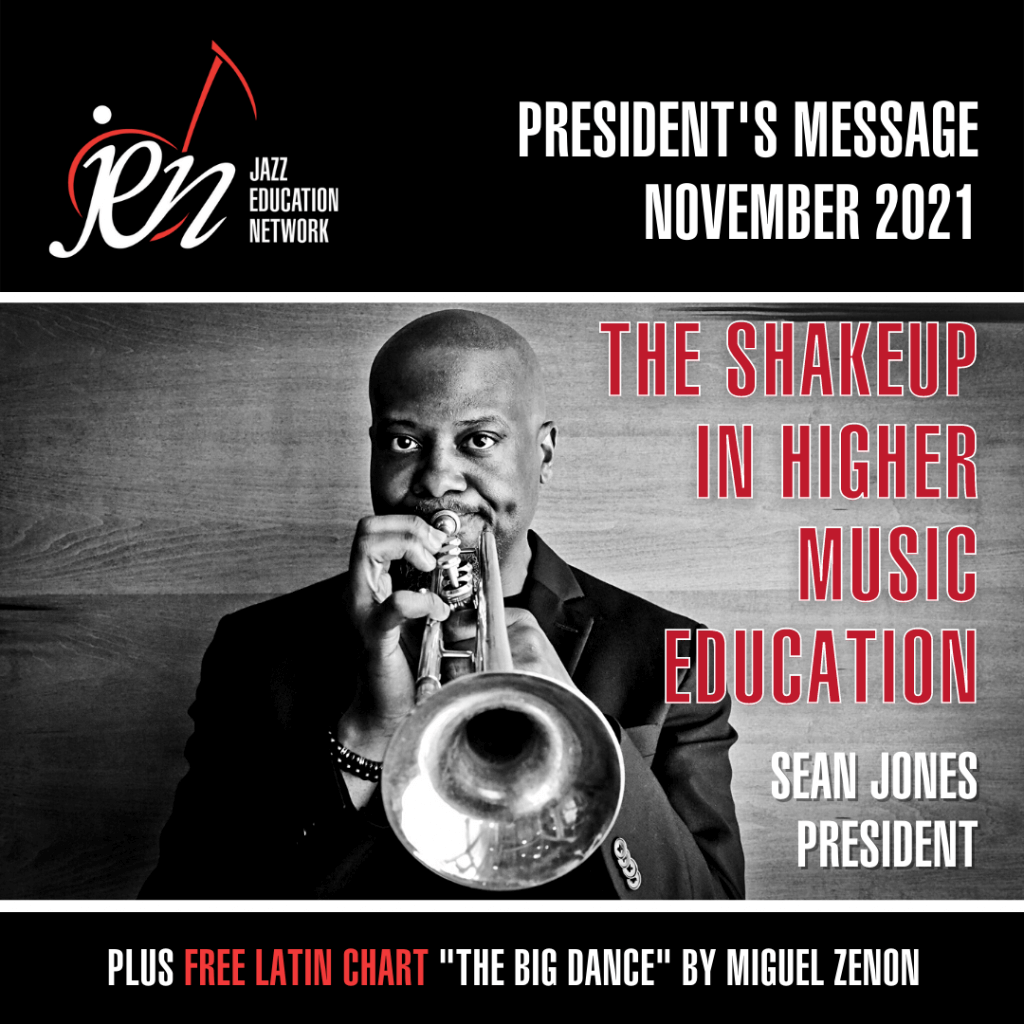
Greetings everyone. I’m Sean Jones, the president of the Jazz Education Network, and this is our monthly message. Hope you all are doing very well. This message is a response to some news that I just heard from my Alma mater Youngstown state university. Now, even though I had a wonderful time as a student at Youngstown State, from the faculty to the students, to the experience on campus, I have to recognize that there were some issues there. And the news that I heard was the fact that Youngstown State, like many other institutions, is looking at changing their curriculum. Two of the things that they’re considering doing are as follows: the elimination of the music history degree path and the elimination of the music theory degree path.
Now, when I just heard this news a little bit ago, I was pretty shocked. I said, wow, this is fundamentally going to change things at the school. And I’m not sure if it’s going to be positive or negative. But then I began to think about my time as a student.
I had to take two years of music history. And during those courses, they were pretty much solely focused on European classical composers and those experiences that they went through from 1600s, 1700s, 1800s into now. And maybe only about two or three weeks, a month at the most, where they’re even discussing American music, jazz, R & B, etc. The music theory offerings were pretty much the same thing. We studied a lot of Bach. We analyzed a lot of Beethoven, counterpoint, things like that. And I’m thankful for that experience. However, we barely talked about jazz at all in the regular theory track. There was jazz theory “over there in the corner” for that.
Now I can’t wonder or imagine what it would have been like if those degree paths were diversified from the beginning. Perhaps there should have been music history that offered varying types of genres; jazz, R&B, etc., etc., etc., from the beginning. Same thing for theory. Perhaps students would be more invested in those classes and those degree paths.
And that makes me think that it is time for all of this to change. It’s time for us to revisit how we teach music and higher academia, period. Perhaps it’s time to grab the wrecking ball and start from scratch, focusing more on American music.
We have to admit upon graduation, most of our students are going to go off and perform in wedding bands, they’re going to perform in smaller venues. They’re going to be playing American music a lot more than they would be playing Bach, Brahms and Beethoven.
And again, this is not me saying that Bach, Brahms, Beethoven and all of those folks aren’t important. They shouldn’t be the only things that we focus on in higher academia in the general music curriculum.
So that all being said, as sad as I was to hear the news about those degree paths potentially being eliminated, I remain hopeful that the students who are seeing and going to these schools are actively asking for change. They, ultimately, are the ones with the control. They know what they want to do more than ever upon graduation, and it’s our job to help them get there.
So that being said, I think it’s time to look at the curriculums in higher academia regarding music education and start to focus more on American music. After all, jazz is an American art form. Blues is an American art form. Rock, American. And the list goes on and on.
I am proud to say that I have had teachers that knew that, in spite of the curriculum’s path, the degree paths that I had to go down.
So that being said, let’s put it down on paper. Let’s make it real, so that all of our students, jazz students, classical students, et cetera, can know how to perform this American music.
Thank you so much, and I hope that you all have a wonderful month!
Take care.
– Sean Jones